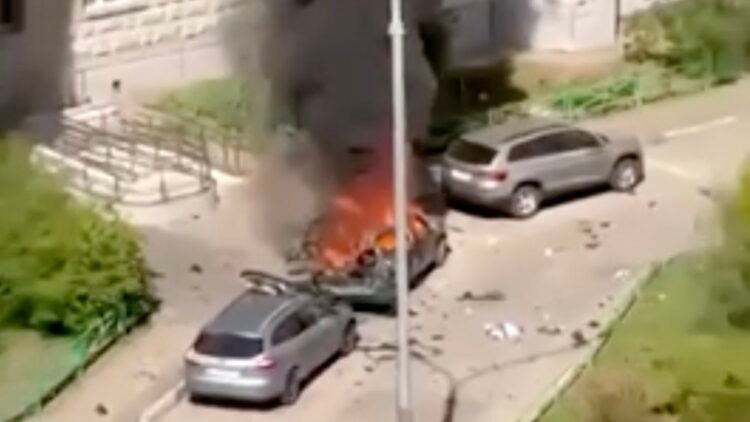MOSCOW — A high-ranking Russian military commander was killed in a targeted car bombing on Friday, marking the second deadly attack on senior Russian officers in just four months. The blast has intensified concerns over the vulnerability of top defense officials and raised fresh questions about internal security as the war in Ukraine grinds on.
Lt. Gen. Yaroslav Moskalik, a deputy chief within the General Staff’s main operational department, died when an explosive device detonated in his vehicle in Balashikha, a residential district on the outskirts of Moscow, according to Russia’s Investigative Committee.
Authorities said the bomb was rigged with shrapnel, suggesting it was designed for maximum lethality. Footage circulating on Russian media shows flames engulfing a car in the courtyard of an apartment complex, with black smoke billowing into the sky.
Svetlana Petrenko, a spokesperson for the Investigative Committee, confirmed that a criminal investigation was underway but provided no details about potential suspects. No group has claimed responsibility.
Foreign Ministry spokesperson Maria Zakharova labeled the killing an act of terrorism, though no official attribution has been made.
A Pattern of Targeted Killings
This latest attack comes just months after Lt. Gen. Igor Kirillov, head of Russia’s elite Radiation, Chemical, and Biological Protection Forces, was killed in a similar explosion in December. That device, concealed in an electric scooter parked near his home, detonated as Kirillov exited his building for work. His assistant was also killed in the blast.
Following Kirillov’s assassination, Russian authorities quickly pointed the finger at Ukraine. Days later, Ukraine’s Security Service acknowledged responsibility, describing the operation as part of its broader strategy to “dismantle the Russian military machine from within.”
While there has been no immediate indication of Ukrainian involvement in Moskalik’s death, the method and target suggest a possible continuation of that strategy.
Timing Raises Eyebrows
The bombing occurred just hours before U.S. envoy Steve Witkoff was scheduled to meet with Russian President Vladimir Putin in Moscow — their fourth high-level discussion since February. The meeting is expected to focus on an emerging American proposal for a ceasefire in Ukraine, though neither side has signaled optimism.
The timing of the attack has sparked speculation that it may have been intended to disrupt diplomatic channels or send a warning to the Kremlin about perceived weaknesses in its internal security.
Security Tightened, Tensions Rise
The killing of yet another top military figure has triggered alarm among Russian leadership. Analysts say it exposes glaring vulnerabilities in the personal safety protocols for high-level officials — especially those involved in sensitive military operations.
“This is not just a blow to morale. It’s a message — and it’s likely one the Kremlin is taking very seriously,” said Tatiana Stanovaya, a Moscow-based political analyst. “The symbolism of these assassinations — not on the battlefield, but right in the capital — is hard to ignore.”
As the investigation unfolds, questions are also swirling around possible inside help or intelligence leaks. The precision and proximity of both attacks suggest detailed knowledge of the generals’ routines and locations.
Strategic Implications
While Moscow has yet to accuse Kyiv directly in this latest killing, it’s expected that the government will seek to tie the incident to Ukraine, either directly or through Western support. That could further strain diplomatic efforts and complicate the already fragile negotiations taking place behind closed doors.
If confirmed as the latest in a series of targeted killings, Moskalik’s death may signal a broader escalation in covert operations far from the front lines — with consequences reaching beyond the war zone and deep into Russia’s capital.

 English
English



























































